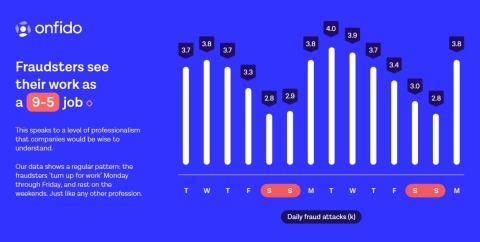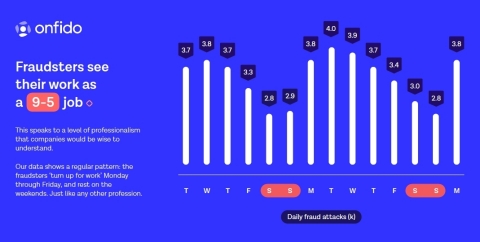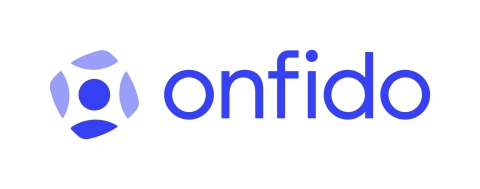SAN FRANCISCO--(BUSINESS WIRE)--Onfido, the global identity verification provider, and voted 1st out of 2,000 companies in this year’s FinTech50, has today published a report authored by its team of document specialists, outlining insights about fraud gained from the millions of identity documents it analyzes every year, across 4,500 document types and 195 countries. It is estimated that remote online identity fraud costs the economy $5 trillion a year, of which only 1% is recovered by the authorities. The Fraud Index shares insights Onfido has gained on the state of remote identity fraud over the past year.
“Identity theft is the fastest-growing crime, with 1 in 3 U.S. adults having been a victim. More sophisticated types of remote identity theft are on the rise, from account takeover and data leaks to impersonation scams,” said Husyan Kassai, CEO and Co-founder at Onfido. “Our Fraud Index is designed to show businesses looking to expand into different countries where our experts have found high levels of document fraud and provides recommendations to mitigate it. It’s important we stay ahead of these bad actors; estimates are that up to 5% of the world's GDP is made up of laundered money (used in terrorist financing, human/drug trafficking, etc.).”
One of the key findings from the report is that fraudsters carry out the majority of their crimes during the working week, much like a regular 9-5 profession. A dip in activity over the weekend suggests they like to take the weekend off. The implication is that fraudsters are working with a professional approach.
There are many reasons why some ID documents are more frequent targets for fraud. It’s partly influenced by the lack of security in older versions of some documents still in circulation. But it’s also linked to how familiar a fraudster could become with a specific form of ID. Some IDs, like the Aadhaar Card (the Indian national ID card), have virtually no safeguards or security features. Others feature complex mathematical rules about personal number and document number formats. Of the top 20 countries highlighted in Onfido’s survey of most fraudulent documents, 18% of all Russian driving licenses analysed were suspected fraudulent. Vietnamese national ID cards came in second (12%) followed by Ukranian driving licenses (7.6%). Russian passports saw the least fraud (4%), while the United States passport came in the middle of the list at (6.1%).
With more than 4.5B data records breaches in the first half of 2018 and given the sheer number of digital image tampering apps, fake ID templates and Social Security Numbers (SSNs) appearing on the Dark Web, this problem is likely to get worse before it gets better.
“UK and US passports contain over 30 security features in their physical form, but fall to just 10 when digitized or moved online, making it easier for fraudsters to spoof IDV systems and scale their attacks,” said Michael Van Gestel, Head of Global Document Fraud, at Onfido. “Our hybrid human/AI approach uses machine learning to automate detection, and uses our experts for training AI models, identifying new fraud techniques and detecting repeat offenders.”
Onfido’s risk engine protects its customers’ bottom lines with fraud exposure rates as little as 0.3% - meaning that for every 1000 documents submitted, 20 will be fraudulent and on average, Onfido will catch 18 of those 20. Proprietary anti-fraud technologies such as Onfido’s facial liveness testing, the ability for its AI to detect fakes that a human eye cannot, combined with its experienced document team, help maintain the market’s most robust protection against spoofing attempts.
With just a photo of an identity document and a selfie video, anyone can access a host of online services in a matter of seconds from some of the biggest names in financial services, transportation, online marketplaces and communities, gaming and other industries—all fueled by Onfido’s artificial intelligence-powered identity verification.
The Fraud Index is available for download here.
About Onfido
Onfido is building the new identity standard for the internet. Our AI-based technology assesses whether a user’s government-issued ID is genuine or fraudulent, and then compares it against their facial biometrics. That’s how we give companies like BBVA, Zipcar and Remitly the assurance they need to onboard customers remotely and securely. Our mission is to create a more open world, where identity is the key to access. Recognized as a global leader in artificial intelligence for identity verification, we’re backed by Salesforce Ventures, SBI Investment, M12 (Microsoft) Ventures, and others. With 270 technologists spread across 6 countries, we’ve raised $100m in funding and power verification for 1,500 customers.
www.onfido.com
www.facebook.com/onfido
www.twitter.com/onfido




